This story features a young woman’s troubles that led her to leave her family behind. The narrator tells this story, beginning with her sister’s return home, more accurately, thinking about how fine life had been before her sister returned. We learned that she is the older sister born exactly a year before her sister, Stella-Rondo, who had married a man and left for a short time then returned home with a child in tow. The narrator seemed to be imagining an audience, and I am led to believe that, since living at the P.O. where mail is handled, the narrator may very well be writing a letter or postcard to someone. The narrator has since left her family’s home and moved to the P.O., and she states that had been the last time she saw her family, “or my family laid eyes on me for five solid days and nights” (p 104), which sounds as though it has only been about five to six days from the argument they all had, which explains how all the details are so rich and clear. At the same time, the neighborhood and town has divided between her and her family, which could mean more time than that had passed. I don’t think it’s been more than a year though. I believe we gather the sense of the narrator’s point at the beginning being that the title leads us to believe she lived at the P.O. and if she starts with her family, then she’s about to tell the story of what happened to cause her to leave. However, at the end is where we know for sure she’s looking back on the experience and learn that she may not have grown much at all since she had left home.
I feel as though the narrator knows this story is about her; I think that’s why she tells us this story. She tells this story as a “Can you believe this bull crap?” She did point fingers and marked her sister down, explaining that her sister was lying to everyone and turning everyone against the narrator. It seems as if she had, at a few points, believed the story is about her sister, as with the end where she assumes Stella-Rondo is telling lies about Mr. Whitaker, but she turns it back to say she only leads to her own conclusions. She makes it known that she isn’t falling for any tricks or lies that will come out of her sister’s, or anyone else in her family, mouth.
I understand that most first person narrations have unreliable narrators, so many of which are biased, young, or simply uninformed. I truly believe that the narrator doesn’t understand her sister, and may never understand her. Despite there is a sense of shame from Stella-Rondo, that the narrator picks up regarding the child, she doesn’t understand why Stella-Rondo would lie so carelessly and even attack her–turning everyone against her to the point she leaves. The narrator also doesn’t understand the rest of her family and why they’re so quick to take on Stella-Rondo’s side, she doesn’t understand any of them but truly sees her sister is out to get her.
I think this story, as I mentioned early, is told more so as a self-defense story along the lines of “Can you believe this crap?” She can’t figure out why they all turned on her other than for the lies Stella-Rondo had told. What could the narrator have done to make them all trust her less than Stella-Rondo, or is it that she is merely just someone everyone takes their problems out on for no good reason? I would certainly say that the narrator is envious and angry throughout her story. The narrator was jealous of her sister for taking Mr. Whitaker, always getting her way, and getting everything handed to her when she always dropped it without a good reason. The narrator was upset that Stella-Rondo had things handed to her on a silver platter but hits it and spills everything all over the place, leaving nothing good for anyone else. She had tried being tender with her family, but as they started turning on her, she made them look less and less pleasing. I think the narrator changed her tone throughout the story. She began with a soft, caring voice — maybe almost happy as she recalled times before her sister returned — about her mother, grandfather, and uncle. The narrator tried not to disrespect her family, despite her sister made it out that she was disrespectful. All the narrator did was try to speak up about things she found needed to be talked about and stood up for herself, but they all turned regardless of how hard she tried. She ultimately wiped her hands of them, and she took what was gifted to her and what she spent more time and money in than the others in her family. Telling this story was meaningful to the narrator, I find, because it’s her growing up and getting out of a toxic situation and family. It was the start of her next chapter in life by the end of a bad one. It was her way of remembering what they did to her and to never forget it.





 Over the course of the story, it becomes clear that there is a change overtaking the father, for example changing church affiliation and wearing scuba gear around the house. At one point, Joel follows his father and watches what his ‘church’ does. They engage in a strange ritual, that includes the pastor holding a disgruntled rattlesnake and Joel’s father speaking in a strange tongue. Joel’s father meets with him afterwards and tries to convey why he chooses to go to church instead of following the medical treatments recommended to him. Joel remains unable to understand, and his father tells him that he hopes Joel never does. However, he eerily mentions that the doctor at the hospital had hinted that Joel may be subject to the same type of depression as him some time in the future. For some reason, Joel never tells his mother about his venture. Perhaps out of respect for his father’s privacy. Or perhaps because Joel doesn’t want his mother to start worrying about him as well.
Over the course of the story, it becomes clear that there is a change overtaking the father, for example changing church affiliation and wearing scuba gear around the house. At one point, Joel follows his father and watches what his ‘church’ does. They engage in a strange ritual, that includes the pastor holding a disgruntled rattlesnake and Joel’s father speaking in a strange tongue. Joel’s father meets with him afterwards and tries to convey why he chooses to go to church instead of following the medical treatments recommended to him. Joel remains unable to understand, and his father tells him that he hopes Joel never does. However, he eerily mentions that the doctor at the hospital had hinted that Joel may be subject to the same type of depression as him some time in the future. For some reason, Joel never tells his mother about his venture. Perhaps out of respect for his father’s privacy. Or perhaps because Joel doesn’t want his mother to start worrying about him as well. beach, envied by old men, lusted after by young girls; he has everything. But when little Becky Spencer is choking to death, Josh realizes he’s completely helpless and nothing he has can save her. He’s done what he’s been trained to do if someone is drowning, but Becky is choking to death on land, and he has no idea how to save her life. Shouldn’t he, after all? The beach is his kingdom, here he is large and in charge. Ric and Mrs. Spencer even tell him he should know what to do. Instead, Mrs. Lovenheim—the woman who makes him feel superior due to his false belief of her admiration—calmly walks up to Becky and performs the Heimlich maneuver; she does what Josh could not. His inability to save Becky’s life rocks him to the core. What does he really have to offer? He goes to see Mrs. Lovenheim that night to thank her for saving Becky and quickly realizes that she doesn’t recognize him. It’s at this moment that he understands he has nothing, and his composure shatters. His perspective on himself changes, and he never looks at the beach the same way again.
beach, envied by old men, lusted after by young girls; he has everything. But when little Becky Spencer is choking to death, Josh realizes he’s completely helpless and nothing he has can save her. He’s done what he’s been trained to do if someone is drowning, but Becky is choking to death on land, and he has no idea how to save her life. Shouldn’t he, after all? The beach is his kingdom, here he is large and in charge. Ric and Mrs. Spencer even tell him he should know what to do. Instead, Mrs. Lovenheim—the woman who makes him feel superior due to his false belief of her admiration—calmly walks up to Becky and performs the Heimlich maneuver; she does what Josh could not. His inability to save Becky’s life rocks him to the core. What does he really have to offer? He goes to see Mrs. Lovenheim that night to thank her for saving Becky and quickly realizes that she doesn’t recognize him. It’s at this moment that he understands he has nothing, and his composure shatters. His perspective on himself changes, and he never looks at the beach the same way again.